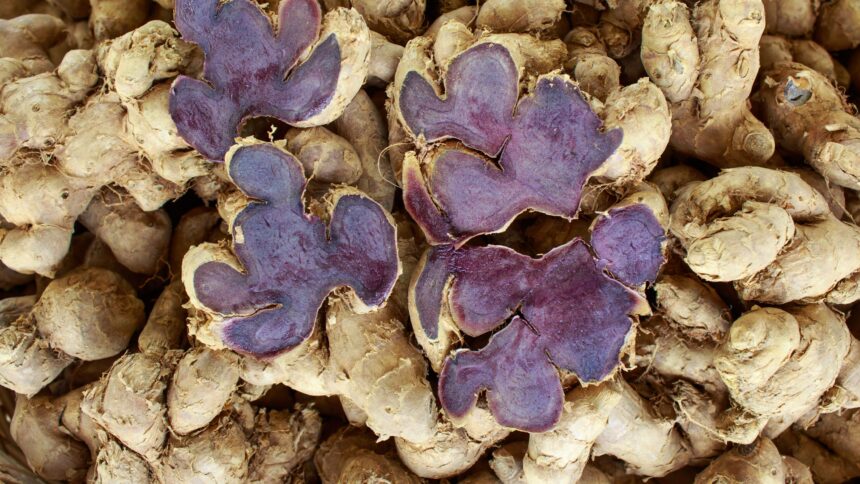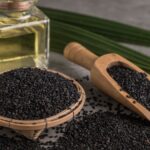In the world of natural remedies and herbal medicine, black ginger has emerged as a powerhouse ingredient, revered for its numerous health benefits and versatile uses. This blog post delves into the wonders of black ginger, offering an in-depth look at its origins, health benefits, differences from regular ginger, uses, safety considerations, and more. Whether you’re a health enthusiast or simply curious about this potent root, read on to discover why black ginger deserves a spot in your wellness routine.
What is Black Ginger?
Definition and Botanical Information
Black ginger, scientifically known as Kaempferia parviflora, belongs to the Zingiberaceae family, which also includes regular ginger and turmeric. Unlike its more common counterparts, black ginger is distinguished by its dark, almost black rhizomes. The plant itself is relatively small, with broad leaves and delicate purple flowers.
Origins and History
Black ginger is native to Southeast Asia, particularly Thailand, where it has been used for centuries in traditional medicine. Known locally as “Krachai Dam,” it was often utilized for its stimulating properties and as a natural remedy for various ailments. Historical records suggest that black ginger was revered for its ability to enhance physical performance, boost energy, and improve overall well-being.
Health Benefits of Black Ginger
General Benefits
Black ginger is celebrated for its wide range of health benefits, making it a valuable addition to any health regimen. It is known for its antioxidant properties, which help combat free radicals and reduce oxidative stress. Additionally, black ginger has anti-inflammatory effects, which can alleviate pain and inflammation.
For the Body
What Does Black Ginger Do for the Body?
Black ginger has a positive impact on multiple bodily functions. It enhances circulation, boosts energy levels, and improves overall vitality. Its active compounds, particularly polymethoxyflavones, are believed to contribute to these benefits.
Is Black Ginger Good for High Blood Pressure?
Research indicates that black ginger may help manage high blood pressure. Its vasodilatory effects can promote better blood flow and reduce the strain on the cardiovascular system.
Does Black Ginger Reduce Visceral Fat?
Studies suggest that black ginger can aid in reducing visceral fat, the harmful fat stored around internal organs. This is achieved through its ability to enhance metabolism and promote fat oxidation.
Does Black Ginger Increase Testosterone?
Black ginger is often touted for its potential to boost testosterone levels. Some studies have shown that it can enhance male reproductive health by increasing testosterone production, which can improve libido and muscle mass.
Is Black Ginger Good for Kidneys?
While more research is needed, preliminary findings suggest that black ginger may support kidney health by reducing oxidative stress and inflammation, which are common contributors to kidney damage.
Is Black Ginger Good for Hair Growth?
Black ginger’s antioxidant and anti-inflammatory properties can promote a healthy scalp environment, potentially aiding in hair growth and reducing hair loss.
For Specific Conditions
Impact on High Blood Pressure
As mentioned earlier, black ginger’s ability to improve blood circulation and relax blood vessels can be beneficial for individuals with high blood pressure. Regular consumption may help maintain healthier blood pressure levels.
Effectiveness in Reducing Visceral Fat
By boosting metabolism and enhancing fat oxidation, black ginger can be an effective natural aid in reducing visceral fat, which is associated with various metabolic disorders.
Black Ginger vs. Regular Ginger
Comparative Analysis
What is the Difference Between Black Ginger and Normal Ginger?
While both black ginger and regular ginger belong to the same botanical family, they differ significantly in their chemical composition and health benefits. Black ginger contains higher levels of polymethoxyflavones, which contribute to its unique properties.
Is There a Difference Between Ginger and Black Ginger?
Yes, there is a notable difference. Regular ginger, or Zingiber officinale, is commonly used for its digestive and anti-nausea properties, whereas black ginger is known for its energy-boosting and metabolism-enhancing effects.
Are Black Ginger and Black Turmeric the Same?
No, black ginger and black turmeric are not the same. Black turmeric (Curcuma caesia) is another rhizome with its own distinct set of benefits and uses. It’s important not to confuse the two, as they have different active compounds and health effects.
What is the Other Name for Black Ginger?
Black ginger is also known as “Krachai Dam” in Thailand. This name is often used in traditional medicine and local markets.
What is the English Name for Black Ginger?
In English, black ginger is commonly referred to simply as “black ginger,” although its scientific name, Kaempferia parviflora, is also used in academic and scientific contexts.
Uses of Black Ginger
Daily Consumption
Can You Take Black Ginger on an Empty Stomach?
Yes, black ginger can be taken on an empty stomach. Doing so may enhance its absorption and effectiveness. However, those with sensitive stomachs should consider starting with a small dose.
Should You Eat Ginger in the Morning or at Night?
Black ginger can be consumed at any time of the day, depending on your needs. Taking it in the morning can provide a natural energy boost and improve focus, while consuming it in the evening can aid in digestion and relaxation.
How to Prepare Ginger for Belly Fat
To harness black ginger’s fat-reducing properties, you can prepare it as a tea or add it to smoothies. Simply slice the black ginger root and steep it in hot water for about 10 minutes, or blend it with fruits and vegetables for a nutrient-dense smoothie.
What’s the Best Way to Take Black Ginger?
The best way to take black ginger depends on personal preference and health goals. It can be consumed as a tea, in smoothies, as a supplement, or even in powdered form added to various dishes.
What is the Best Form of Ginger to Take?
Black ginger is available in several forms, including fresh root, dried powder, capsules, and extracts. Each form has its benefits, but capsules and extracts often provide a more concentrated dose of its active compounds.
In Tea and Other Preparations
Is Black Ginger Tea Good for You?
Yes, black ginger tea is an excellent way to incorporate this powerful root into your diet. It retains many of the root’s health benefits, such as boosting metabolism, improving circulation, and providing antioxidant support.
Safety and Side Effects
Potential Side Effects
What are the Side Effects of Black Ginger Root?
While black ginger is generally safe for most people, some may experience mild side effects such as stomach upset, heartburn, or diarrhea, particularly when consumed in large amounts.
What Happens if You Take Ginger Every Day?
Daily consumption of black ginger is usually safe and can enhance overall health. However, it’s important to monitor for any adverse reactions and consult with a healthcare provider if you have pre-existing conditions or are taking other medications.
What are the Side Effects of Ginger in the Body?
Similar to black ginger, regular ginger can cause mild gastrointestinal issues if consumed in excess. It’s always best to start with a small amount and increase gradually.
How Much Ginger is Too Much in One Day?
The recommended daily intake of ginger varies, but most experts suggest not exceeding 4 grams per day to avoid potential side effects like heartburn, diarrhea, and stomach upset.
Drug Interactions
What Medications Should Not Be Taken with Ginger?
Ginger can interact with certain medications, including blood thinners, diabetes medications, and high-blood pressure drugs. If you are taking any of these, consult your healthcare provider before adding black ginger to your regimen.
Precautions
Who Should Avoid Ginger?
Individuals with bleeding disorders, or gallstones, or those who are pregnant should use ginger with caution. Always seek medical advice if you have health conditions that might be affected by ginger consumption.
When Not to Take Ginger?
Avoid taking ginger before surgery due to its blood-thinning properties. Additionally, if you experience severe heartburn or gastrointestinal issues, it may be best to limit or avoid ginger.
Myths and Facts
Detoxification
Does Ginger Really Detox Your Body?
While ginger can support liver function and promote digestion, the concept of “detoxing” the body is more complex. Ginger aids in the body’s natural detoxification processes but isn’t a magical solution.
Reproductive Health
Does Ginger Increase Estrogen?
Some studies suggest that ginger can influence hormone levels, but more research is needed to confirm its effect on estrogen specifically. It is known to have a balancing effect on hormones.
What are the Disadvantages of Ginger in Men?
Excessive consumption of ginger may lead to digestive issues or interact with medications. It is important to consume it in moderation and consult a healthcare provider if you have concerns.
What Does Ginger Do for Males?
For males, ginger can improve circulation, boost testosterone levels, and enhance libido. Its anti-inflammatory properties also support overall health and well-being.
Does Ginger Increase Stamina in Bed?
Ginger is often credited with enhancing stamina and performance due to its ability to improve blood flow and energy levels. However, individual results may vary.
How Long Does It Take Ginger to Increase Testosterone?
The exact timeframe for ginger to impact testosterone levels can vary. Some studies suggest noticeable effects after several weeks of consistent consumption.
Inflammation and Pain Relief
How Quickly Does Ginger Reduce Inflammation?
Ginger’s anti-inflammatory properties can start to take effect within a few hours, but significant relief from chronic inflammation may take several days to weeks of regular use.
Black Ginger and Modern Research
Recent Studies and Findings
Recent studies have highlighted black ginger’s potential in improving physical performance, managing metabolic disorders, and supporting cardiovascular health. Ongoing research continues to explore its full range of benefits and therapeutic applications.
Future Potential
The future of black ginger research looks promising, with scientists investigating its potential in treating various conditions such as diabetes, obesity, and even neurodegenerative diseases. Its unique compounds offer a wealth of therapeutic possibilities that warrant further exploration.
Cultivation and Availability
Growing Black Ginger
Can I Grow Black Ginger?
Yes, black ginger can be grown at home, especially if you live in a warm, humid climate similar to its native Southeast Asian habitat. It thrives in well-drained soil with partial shade. You can start from rhizomes, planting them just below the soil surface and keeping the soil consistently moist but not waterlogged. Patience is key, as it can take several months for the plant to mature.
Where to Find Black Ginger
Where is Black Ginger Found?
Black ginger is predominantly found in Southeast Asia, particularly in Thailand. It is also cultivated in parts of Indonesia, Malaysia, and other tropical regions. In recent years, its popularity has grown, leading to increased availability in health food stores and online marketplaces worldwide.
What is the Best Ginger in the World?
Determining the “best” ginger depends on your specific health needs and culinary preferences. Black ginger is renowned for its robust health benefits and unique properties, making it a standout for those seeking potent medicinal effects. Regular ginger, however, remains a staple in kitchens globally for its versatility and digestive benefits.
Conclusion
Incorporating black ginger into your health regimen offers a plethora of benefits, from boosting energy and enhancing metabolism to supporting cardiovascular health and potentially aiding in weight management. This remarkable root, with its rich history and powerful properties, is a testament to the wonders of natural medicine.
Final Thoughts
Black ginger stands out as a powerful natural remedy with a wide array of health benefits. Whether you’re looking to boost your energy, improve your metabolic health, or explore natural ways to enhance your overall well-being, black ginger is a worthy addition to your wellness toolkit. As always, consult with a healthcare provider before making significant changes to your health regimen, especially if you have existing health conditions or are taking other medications.
References
- Wattanathorn, J., et al. (2012). “Evaluation of the antioxidant and anti-inflammatory properties of Kaempferia parviflora in vitro.” Journal of Medicinal Plants Research, 6(5), 618-624.
- Saokaew, S., et al. (2017). “Clinical effects of Krachaidum (Kaempferia parviflora): A systematic review.” Journal of Ethnopharmacology, 194, 105-122.
- Tewtrakul, S., Subhadhirasakul, S. (2008). “Anti-allergic activity of some selected plants in the Zingiberaceae family.” Journal of Ethnopharmacology, 116(3), 481-485.
- Abas, F., et al. (2005). “Antioxidant and nitric oxide inhibition activities of selected Malay traditional vegetables.” Food Chemistry, 95(1), 566-573.
- Rujjanawate, C., et al. (2005). “Anti-gastric ulcer effect of Kaempferia parviflora.” Journal of Ethnopharmacology, 102(1), 120-122.
- Chaturapanich, G., et al. (2008). “Effect of Kaempferia parviflora on sexual performance in male rats and its toxicity.” Reproduction and Fertility Development, 20(1), 1-5.




